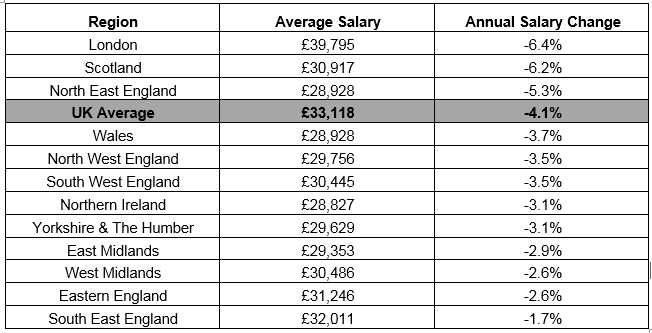- Highest number of advertised jobs available since the recession, as the number of positions reaches 1,244,772, up by almost a third (31.1%) since November 2014
- Advertised salaries see first monthly increase in eight months, up by 0.2% to reach £33,118, as wages look set to rise despite declines across all regions year-on-year
- Falling unemployment means there are now almost two vacancies to every jobseeker
- Customer Service jobs lead the way, seeing the largest 12-month increase in average advertised salary (9.3%), closely followed by Consultancy jobs (9.1%)
- Energy Oil & Gas (-12.0%) and Legal jobs (-11.0%) experience the largest year-on-year advertised salary drops
November’s total number of advertised vacancies has set a new post-recession record – rising by almost a third annually – according to the latest UK Job Market Report from Adzuna.co.uk.
November saw 1,244,772 advertised vacancies across the UK, up by 31.1% compared to 949,788 a year ago – and hitting a new post-recession high. This total has overtaken the previous record of 1,229,131 vacancies in October last month. As a festive influx of roles enter the jobs market, more seasonal and temporary positions are providing a last-minute lift towards the end of the year.
This growth in vacancies has been accompanied by a monthly rise in average advertised salaries – the first increase for 8 months. The UK average advertised salary now stands at £33,112, up 0.2% from £33,043 in October. This increase could be the first signal of future wage inflation.
A falling unemployment rate has also had a substantial impact in November. According to the latest figures from the ONS, the unemployment rate is now 5.2% – its lowest level since the three months to January 2006. An increase in self-employment has particularly contributed to rising employment, with just 641,989 claimants recorded this month.
As a result, the ratio of jobseekers to vacancies has further declined in November to also reach a record post-recession low of 0.52 per position. Since November 2014, job competition has reduced by a staggering 71.2% from 0.89.
Table 1:

Doug Monro, co-founder of Adzuna, explains: “The past year has been a testing time for the UK jobs market. While overall falling unemployment and rising real wages have contributed to solid foundations for job hunters – there are still major cracks which can’t be easily repaired. Rising vacancies can be a sign of strength, but also a sign of imbalance. Festive roles have boosted vacancy numbers, but this will only provide a short-term impetus. The skills shortage within the labour market, which has been constant throughout the year, has resulted in vacancies remaining unfilled for longer.
“However, there are positive signs to be taken from November’s jobs market. Average advertised salaries have finally started to climb upwards. This could be fantastic for jobseekers who can look forward to getting the salary they deserve.
“The New Year will certainly bring new challenges for the jobs market. With the National Living Wage being implemented in April, employers will be forced to adjust and this might be at the expense of increasing staff numbers. As more and more employers are required to offer workplace pensions by law, there is additional pressure on bottom lines. The jobs market will hopefully prove its resilience and adapt to these new changes.”
No UK region records average advertised salary growth across 2015
November saw the first rise in advertised salaries across the UK for eight months but despite this increase it’s been a year of declining advertised salaries across the board in 2015.
London and Scotland in particular have seen the worst falls in advertised pay. The capital has been the hardest hit region, seeing a 6.4% fall to £39,795. Scotland has similarly seen a substantial fall of 6.2% to £30,917.
At the same time, the East of England has seen the smallest declines, proving to be especially resilient. While seeing the smallest falls in advertised salaries, the region boasts some of the highest wages. The average position in South East England offers £32,011. When compared to the highest average salary in the North, £29,756 in North West England it’s clear that the North-South divide is going strong – 2016 could be the year for the North to strike back.
Doug Monro, co-founder of Adzuna, concludes: “November could be a turning point for advertised salaries. It’s been a disappointing year in terms of average advertised salary levels overall. With the economy recovering and consistently low inflation, this bright picture has been at odds with falling advertised pay and 2015 has certainly been a year of retention. Employers are really struggling to find the right talent as competition increases and increases. And so, its jobseekers who have suffered from smaller salaries for advertised roles. As we head into next year however, employers finding higher financial gains may be willing to splash some cash on new hires.
“For the moment though, it’s the capital which is bearing the brunt of reduced advertised pay. It’s a hard climate for job hunters in London, and as pay for graduate jobs drops it’s not a particularly positive outlook for the city. However, jobseekers in the capital still have the luxury of the highest pay in the UK. For Scotland however it has also been a difficult year, the country’s dependency on the Energy Oil & Gas sector has left it vulnerable to fluctuations in that sector – which has recently been plagued by job losses.
“The East of the country is enjoying a revival. As the area’s reputation as a commuter hotspot grows, boosted by the rise of technical hubs in areas such as Cambridge, its potential for future growth is impressive. For those seeking work in the South, its likely advertised salaries will continue to withstand drastic falls in the future.”
Table 2: Biggest improvers – UK regions by average salary in 2015

Salaries for Customer Service jobs continue to climb
Those looking to work in Customer Services can expect a larger pay packet than their predecessors. Average advertised salaries for roles stand at £23,629, up 9.3% from £21,626 in November last year. This has meant the sector has seen the fastest rate of growth across the last twelve months.
Doug Monro, co-founder of Adzuna, comments: "Customer services is an industry which is rapidly growing in both scale and importance. It’s an industry which requires an astute attention to detail and a strong customer service team is undeniably a valuable attribute to any company. Companies may place extra value on the importance of customer care near Christmas, but it should be a top priority all year round. Social media poses new threats to reputation and complaints can no longer be brushed under the carpet.”
Table 3: Biggest improvers – job sectors by average salary

Logistics & Warehouse jobs see salaries strengthen
Logistics & Warehouse jobs have seen an annual advertised salary increase to £29,947, experiencing a yearly rise of 3.8%, up from an average £28,854 in November 2014. This rise was closely followed by HR & Recruitment jobs (3.6%) and also Property jobs (1.7%).
Warehousing roles have also proved the most popular vacancies on the Adzuna website, with currently more than 42,000 vacancies.
Doug Monro, co-founder of Adzuna, comments: “Logistics & Warehouse jobs can be a fantastic boost for local economies. Particularly in the North, they play a crucial part in providing work – whether it be permanent or seasonal. This sector is not particularly well paid and it’s encouraging to see that the industry is beginning to step up and pay deserved salaries to new and existing staff.”
“Christmas always creates a rise in such work, and this powers a considerable increase in the number of roles – which many people rely on to grant an extra financial boost in the run-up to Christmas.”
Energy, Oil & Gas workers feel the heat
Average advertised salaries for jobs in Energy, Oil & Gas experienced the largest annual decrease to £41,193, representing a fall of 12.0% since November last year.
Table 4: Worst improvers – job sectors by average salaries

Doug Monro, co-founder of Adzuna, explains: “It’s been a tough year for workers in the energy sector, with oil prices nose-diving further. This industry, more than any other is intrinsically tied to the economic forecast and is suffering from a storm of setbacks. For Scotland – the stronghold of the UK’s energy sector – it’s a worrying time for many workers and hopefully the industry can bounce back next year.”
Legal workers lose out in 2015
Those searching for legal jobs will find themselves disappointed with their financial prospects – as advertised salaries for roles dropped by 11% over the last twelve months.
Doug Monro, co-founder of Adzuna, comments: “Legal workers generally don’t receive much sympathy from the rest of the UK workforce – with the sector seen as a sure guarantee of a high salary. However, this may not be the case for all legal employees. The industry is renowned for internal development, reducing the need to recruit senior talent externally from the jobs market. Lawyers might have had a tough year in 2015, but with January allegedly the divorce season – as well as a time of year when individuals put their legal affairs in order – their workloads, and salaries could really pick up.”







